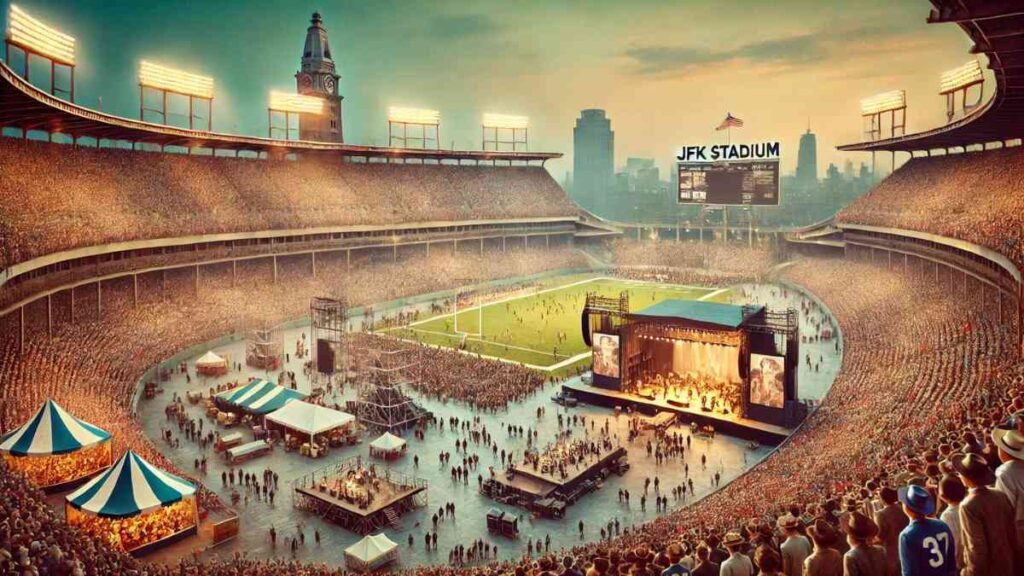JFK Stadium Philadelphia, formerly one of the nation’s premier venues, was renowned for hosting iconic events, from historic sports games to groundbreaking concerts. Constructed in 1926, it quickly became a hub for memorable moments, including hosting The Beatles, Pope John Paul II, and Live Aid in 1985. Though the stadium was eventually demolished in 1992, its influence lives on in Philadelphia’s culture and history, symbolizing an era of unparalleled sports and entertainment experiences.
Introduction
Philadelphia’s JFK Stadium was more than just a sports ground. This legendary venue, steeped in cultural and sports history, served as a focal point for both local and global audiences. Known for its sheer capacity and iconic events, JFK Stadium was a stage for countless unforgettable moments, ranging from sports championships to era-defining concerts.
The Construction and Vision Behind JFK Stadium
Built in 1926 and originally known as Philadelphia Municipal Stadium, JFK Stadium’s construction was a bold undertaking by city planners. The stadium was initially envisioned as a multi-purpose facility designed to attract large crowds and place Philadelphia on the map as a premier city for sports and entertainment. With a seating capacity of over 100,000, it was one of the largest stadiums in the country, symbolizing the city’s commitment to grandeur.
Notable Sporting Events Hosted at JFK Stadium
JFK Stadium was famous for hosting numerous sports events, particularly football and soccer games, attracting audiences from across the country. The Army-Navy Game, held there annually for decades, solidified its role as a prominent sports venue. Philadelphia residents and visitors alike gathered to witness these intense games, filling the stands with an unmatched enthusiasm that added to the stadium’s allure.
A Center for Soccer in America
In addition to American football, JFK Stadium played a significant role in promoting soccer in the United States. The venue hosted matches during the Philadelphia Bicentennial Cup Tournament, including some of the earliest international matches on American soil. These games not only highlighted the growing interest in soccer but also expanded JFK Stadium’s legacy within international sports.
The Musical Legacy of JFK Stadium
While its contribution to sports is well-noted, JFK Stadium also carved a name in the music industry. The Beatles performed there in 1966, marking one of the most historic concerts of the time. The venue hosted other renowned acts, including the Rolling Stones, Grateful Dead, and Bruce Springsteen, captivating audiences with larger-than-life performances. Each concert further cemented JFK Stadium’s reputation as a prime location for the world’s most influential musicians.
Live Aid 1985: An Unforgettable Moment in Music History
One of the most notable events hosted at JFK Stadium was the Live Aid concert in 1985. This concert, held simultaneously in Philadelphia and London, drew a global audience of over 1.9 billion people, with performances by artists such as Madonna, Queen, and U2. The event not only raised millions for famine relief in Ethiopia but also highlighted JFK Stadium’s ability to unite people worldwide through music.
Pope John Paul II’s Historic Visit to JFK Stadium
Another pivotal moment in the stadium’s history was the 1979 visit of Pope John Paul II. The Pope’s Mass attracted a vast crowd, with attendees eager to witness this historic moment in person. This event solidified JFK Stadium’s place as a site not only for entertainment but also for significant cultural and spiritual gatherings.
JFK Stadium’s Role in Philadelphia’s Identity
JFK Stadium contributed immensely to Philadelphia’s identity. The stadium, with its grand architecture and cultural events, became a symbol of unity for Philadelphia’s diverse communities. From sports enthusiasts to concert-goers, people of all backgrounds found common ground in their love for the events held at this venue.
A Venue with Unforgettable Ambiance
The ambiance of JFK Stadium, with its open design and capacity for massive crowds, was unforgettable. This ambiance played a significant role in enhancing the experience for attendees, whether they were there for a football game or a rock concert. The stadium’s unique design allowed for an immersive experience, drawing people from across the country.
The Demolition and Legacy of JFK Stadium
Despite its popularity, JFK Stadium eventually fell into disrepair. The structure could no longer meet modern safety standards, leading to its demolition in 1992. However, the legacy of JFK Stadium remains firmly entrenched in Philadelphia’s culture. The memories created there—both in sports and entertainment—continue to be celebrated by fans and residents alike.
The Spectrum and Wells Fargo Center: Modern-Day Venues Carrying JFK’s Legacy
Although JFK Stadium no longer exists, its legacy lives on through Philadelphia’s current venues like the Wells Fargo Center and The Spectrum. These newer venues continue to draw large crowds for both sports and entertainment, symbolizing the evolution of JFK Stadium’s historic influence on the city’s entertainment scene.
Conclusion: A Legacy That Endures
The legacy of JFK Stadium Philadelphia is one of grandeur, community, and unforgettable experiences. This stadium will forever be remembered as a place where sports fans, music lovers, and diverse communities gathered to celebrate some of the most remarkable events in history. Its influence endures, reflecting the city’s passion for bringing people together and creating memories that last a lifetime.
For More Visit, MirrorMagazine.co.uk


